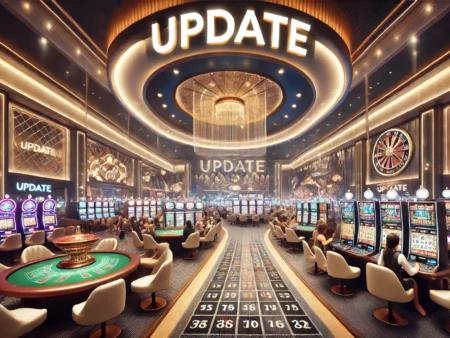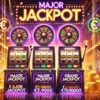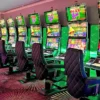Roulette in Batumi: Discover the intriguing, secret history of roulette, from its Venetian origins to its rise in France and Germany under Napoleon and Hitler.
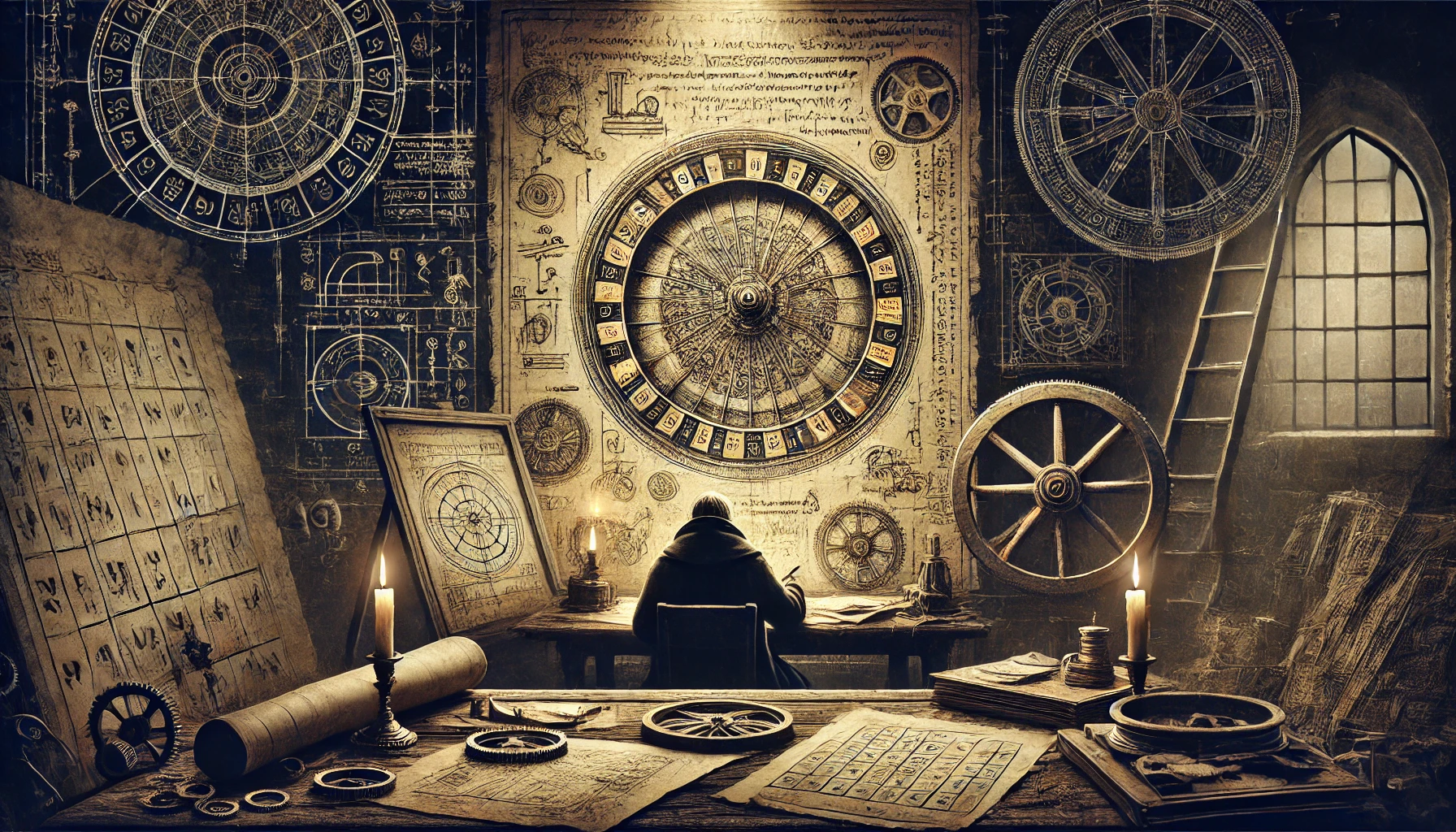
Roulette in Batumi: A popular game today. But where does it originate? In the dimly lit salons of the 17th century, far from the public eye, a game was taking shape that would soon captivate the attention of kings, revolutionaries, and conquerors alike: roulette. While the French mathematician Blaise Pascal has been falsely credited with inventing the game, the true origins of roulette are steeped in secrecy, driven by a fascinating tale of espionage, ambition, and power. This clandestine journey begins not in France, but in the mysterious halls of Venetian gambling houses, where the spark of a dangerous new idea was born—one that would eventually sweep across Europe and beyond.
The Venetian Enigma: The Birth of Roulette
In the late 16th century, Venice was not only a city of gondolas and stunning architecture but also a haven for the wealthy elite and their favorite pastime—gambling. Hidden away in exclusive gambling clubs, an enigmatic man, known only as Il Maestro, was rumored to be working on a revolutionary device. It was said that he was obsessed with fate and chance, and his mysterious invention was a way to capture the randomness of life itself. His device, which was little more than a crude wheel with numbered compartments, had a hypnotic effect on anyone who watched it spin.
Il Maestro had no interest in the frivolities of the nobility—he saw the wheel as something more, something that could predict or even control destiny. But this was not a time for grand ideals. The Venetian authorities, aware of the growing underground gambling scene, were tightening their grip, and soon the gambling clubs where Il Maestro frequented were shut down. With his invention still incomplete, Il Maestro disappeared into the night, taking the secret of his wheel with him.
For decades, the wheel remained lost, a ghostly rumor among gamblers and mathematicians across Europe. That is, until it resurfaced in the unlikeliest of places: the war-torn France of the 18th century.
The French Connection: From Pascal to Napoleon
During this period, a brilliant young man named Blaise Pascal was making waves with his groundbreaking work in probability theory. A child prodigy, Pascal was known for his inquisitive mind and love of challenging the unknown. While his work on the mathematics of probability led many to assume he invented roulette, the truth was far more complex. Pascal had no interest in gambling—his passion was in the realms of science and philosophy. Yet his work laid the intellectual foundation that would eventually fuel the popularity of gambling games across Europe.
Enter Napoleon Bonaparte.
By the late 18th century, France had undergone the bloody turmoil of the French Revolution, and Napoleon, with his ambitions of European conquest, was eager to restore France to its former glory. But France’s coffers were empty, and the lavish lifestyles of the nobility had left the economy in disarray. Gambling, outlawed under strict Revolutionary laws, was seen as a potential tool to refill France’s treasury. But more than that, Napoleon was fascinated by the psychological and social effects of gambling. He believed that gambling was not merely about money—it was about the manipulation of human desire, hope, and despair.
Roulette: The forgotten device
In secret meetings with his most trusted advisors, Napoleon learned of a forgotten device that had once captivated the minds of Venetian gamblers: Il Maestro’s wheel. Although this relic of the past had faded into obscurity, whispers of its existence reached the French courts. Through covert channels, Napoleon managed to acquire the plans for this strange game of chance.
Napoleon had the wheel redesigned, modernized, and rebranded. It became a centerpiece in the newly authorized gambling establishments in Paris. Under the supervision of his government, these establishments flourished, and roulette quickly became the favorite game of the French elite. The game, with its unpredictable spins and promise of quick riches, mirrored the unpredictability of the political landscape at the time. In Napoleon’s France, roulette became synonymous with the stakes of power and control.
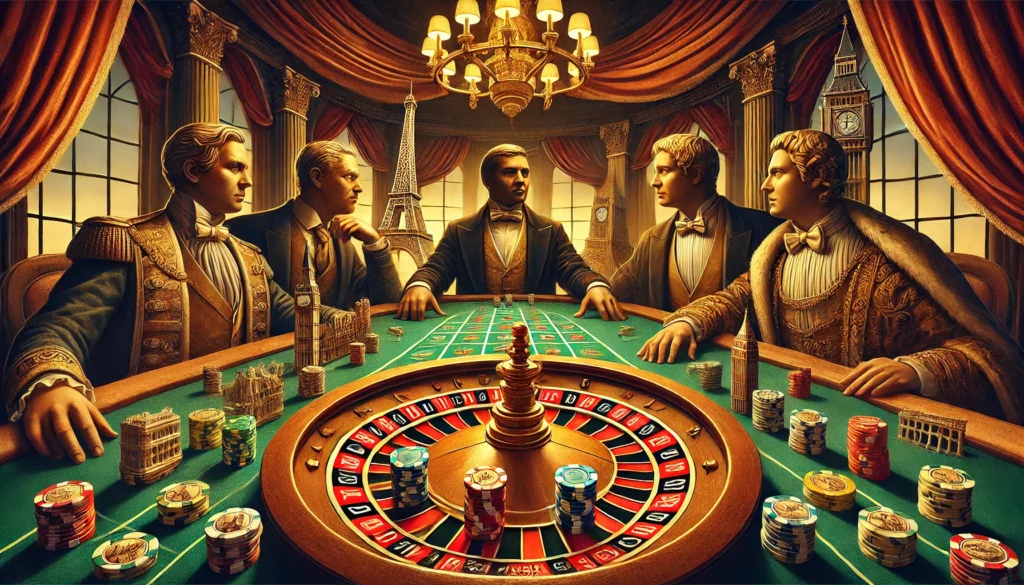
The Russian Gambit: Roulette Crosses Borders
As Napoleon’s empire expanded across Europe, so too did roulette. The game spread like wildfire, finding its way into the courts of Russian Tsars and Austrian aristocrats. But it was in Russia where roulette found its most ardent—and dangerous—fans. The Russian nobility, always eager to test fate, embraced the game with feverish intensity. High-stakes roulette games in the royal courts were whispered about in the streets, and soon, the game began to represent not only wealth but a kind of existential gamble. For the Russian elite, roulette was more than a game—it was a reflection of the precariousness of life in the shadow of the Tsar’s volatile regime.
The Rise and Fall of German Roulette: A Game for Kings and Dictators
As Europe shifted into the 20th century, roulette’s fate took yet another sharp turn. In the aftermath of World War I, Germany was a nation in turmoil. The Weimar Republic, desperate to restore order and stability to the shattered economy, took drastic steps, including the banning of gambling. For a time, roulette, along with other gambling activities, disappeared from the public eye. The bright halls of German casinos went dark, and roulette became a distant memory, whispered about only in the smoky back rooms of illegal gambling dens. But that was all about to change with the arrival of a new political figure—Adolf Hitler.
When Hitler rose to power in 1933, his regime sought to consolidate control over every aspect of German life, including the nation’s entertainment and leisure industries. While the Nazi party’s ideology sought to portray a strict moral code, Hitler and his inner circle recognized the allure and profitability of gambling. However, they also saw gambling—roulette, in particular—as a tool for manipulating the masses, giving them a controlled outlet for their desires while maintaining the regime’s firm grip on power.
Roulette oder Hitler: A wheel as money printing machine for the dictator
Soon after Hitler’s Machtergreifung (seizure of power), the ban on gambling imposed during the Weimar Republic was lifted, and roulette made its return to Germany. Casinos reopened under strict government oversight, becoming places not only of entertainment but of surveillance and control. The Nazis regulated gambling to ensure it served their economic and political goals, making it accessible primarily to the loyal elite and the wealthy who could be monitored.
Roulette, with its intoxicating promise of fortune, became a favored game among high-ranking Nazi officials and those close to the regime. The spinning wheel was not just a game of chance—it was a metaphor for the shifting tides of power in Europe, a symbol of risk and reward at a time when life under the Third Reich was itself a gamble. And so, as the country prepared for war, roulette was once again spinning in the grand casinos of Germany, under the shadow of one of history’s most notorious dictatorships.
Conclusion: Roulette’s Enduring Legacy
Roulette’s journey from the secret gambling dens of Venice to the palaces of European monarchs, and eventually into the hands of dictators like Hitler, is a testament to the game’s mysterious allure. Though many credit Blaise Pascal with its invention, the true origins of roulette remain a complex and fascinating tale of invention, reinvention, and intrigue. The wheel, with its dizzying spins, seems to echo the chaotic forces of history, always unpredictable, always tempting fate.
Even today, roulette continues to captivate millions around the world, from glamorous Las Vegas casinos to Monte Carlo’s grand halls, reminding us that no matter how much the world changes, the timeless appeal of chance and fortune remains.
So the next time you watch the ball spin on the roulette wheel, remember: you are not just playing a game—you are participating in a legacy of intrigue and power that has shaped the fate of kings, emperors, and entire nations. From the secret work of Il Maestro to Napoleon’s ambition and Hitler’s calculated manipulation, the history of roulette is one that stretches far beyond the casino floor—deep into the shadows of European history, where power and fortune have always been intertwined.
